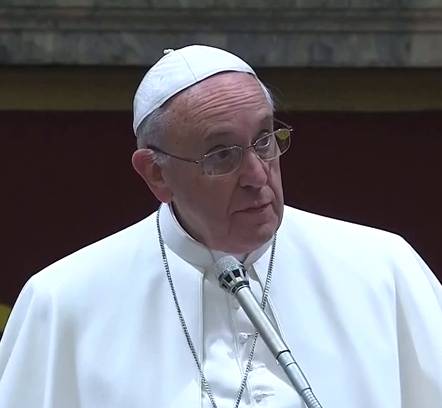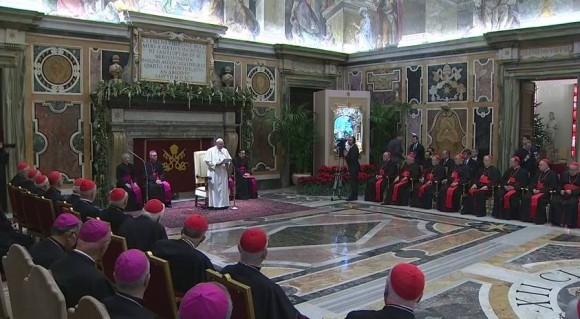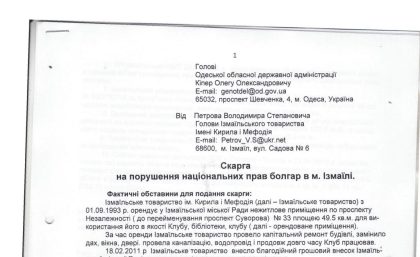Папа Франциск отправи остра и нечувана досега критика за състоянието на Ватикана. Това той направи в коледната си реч пред кардинали, епископи и свещеници.
.
 „Папа Франциск изтъкна 15 болести на Курията“, „Папата в ролята на доктор“, „Петнайсетте гряха на църквата“, „Анатемата на папата срещу духовния Алцхаймер на църквата“, са само част от заглавията в пресата, обобщаващи суровата реч на папата.
„Папа Франциск изтъкна 15 болести на Курията“, „Папата в ролята на доктор“, „Петнайсетте гряха на църквата“, „Анатемата на папата срещу духовния Алцхаймер на църквата“, са само част от заглавията в пресата, обобщаващи суровата реч на папата.
Той си послужи с особени словосъчетания, за да подчертае значението на своята мисъл, че Курията – главния административен орган на Ватикана, страда от „изневярата спрямо Евангелието“ и е заплашен от болести, които трябва да излекува като: духовен Алцхаймер, умствено и духовно вкаменяване, коравосърдечност, тероризъм на празнодумството, екзистенциална шизофрения, прикрит нарцисизъм, боричкания за слава, клюкарските приказки, липсата на самокритика, усещането за безсмъртие, акумулиране на материални блага и др.
.
Ето какво написаха в за речта на Папа Франциск, колегите от българската редакция на Радио Ватикана:
Римската Курия да бъде като „умален модел на Църквата“: това бе пожеланието на Папата към своите най-близки сътрудници във Ватикана, които прие в понеделник на аудиенция в Клементинската зала за традиционната размяна на рождественски пожелания. В дългото си слово Папа Бергольо изброи 15 лечими „болести“, които изискват „търпеливо и постоянно лечение“.
Цитирайки своя предшественик Пий XII, че Църквата е „Мистично тяло на Исус Христос“, Папа Франциск подчерта, че „като динамично тяло, Курията не може да живее без да се храни и лекува“, за което е необходима „здрава и истинска връзка с Христос“. Без тази „жизненоважна“ връзка, всеки един неин член може да се превърне в бюрократ или обикновен чиновник. Папата конкретно „каталогира“ тези болести:
Болестта да се чувстваш „безсмъртен“, „недосегаем“ или дори „незаменим. „Курия, която не си прави самокритика, не се обновява, не се стреми към подобрения, е като болно тяло“. Папата припомни, че едно отиване на гробище ще ни помогне да видим имената на толкова много хора, които „може би са се смятали за безсмъртни, недосегаеми или дори незаменими!“. Това е болестта на онези, които „се превръщат в господари и се чувстват по-висши от другите, а не в услуга на всички. Често е вследствие на болестта власт, на „комплекса на избраниците“, на нарцисизма“.
Болестта от прекалена оперативност или ония, които дотолкова се потопяват в работата, че забравят за „добрата част“, както Марта в библейския разказ на Лука (Лука 10, 38-42). Затова Исус призовава своите ученици «да си починат малко» (Марк. 6,31), защото пренебрегването на необходимата почивка води до стрес и безпокойство. Времето за почивка, за онзи който е свършил своята мисия, е необходимо и трябва да бъде взето предвид: сред семейството и отпуските, като момент за духовно и физическо зареждане. Или както се казва в книгата на Еклисиаста «има време за всяко нещо» (Екл.3, 1-15).
Болестта на умствената и духовната безчувственост. Тя е болестта на онези, които притежават каменно сърце, които „губят вътрешното спокойствие, живостта и смелостта, и се крият зад документите, като се превръщат в „машини за фабрикуване на досиета“, а не Божи хора“, те са неспособни „да плачат с плачещите и да се радват с радостните“.
Болестта за прекомерно планиране. Когато един апостол планира всичко подробно и вярва, че с това нещата напредват, така се превръща в счетоводител и търговец. Необходимо е да се приготви всичко добре, но без да се изпада в изкушението да се затвориш и пилотираш свободата на Светия Дух… Винаги по-лесно удобно да се настаниш в собствените статични и непроменяеми позиции.
Болестта на лошата координация. Когато членовете на Курията „губят единението помежду си, тялото губи своята хармонична функционалност“, като става „оркестър, който издава шум, тъй като неговите оркестранти не си сътрудничат, не са в общение, с чувство за екип“.
Болестта на духовния Алцхаймер или „прогерсивното деградиране на духовните дарби“, което „причинява сериозни щети на личността“, принудждавайки я да живее „в състояние на зависимост от нейните виждания, често имагинерни“. Това се вижда в онзи, който е „загубил памет за срещата си с Господ и който зависи от собствените си страсти, капризи и мании“, изграждайки по този начин около себе си „стени и навици“.
Болестта на съперничеството и на високомерието. „Когато привидното, цветовете на дрехите и отличителните знаци стават главна цел в живота… Това е болестта, която ни прави неискрени мъже и жени, които живеят неискрен „мистицизъм“ и фалшиво „спокойствие“. Самият Свети Павел казва, че те „постъпват като врагове на Кръста Христов“, тъй като „се хвалят с това, от което би трябвало да се срамуват и мислят за земното“(Фил., 3,19).
Болестта на екзистенциалната шизофрения. Засегнатите от нея са „онези, които живеят двойнствен живот, плод на типичното лицемерие на посредствеността и на прогресивната духовна празнота, която нито докторати или академични титли могат да запълнят“. Много често тя поразява ония, които „изоставяйки пастирското служение, се ограничават с бюрократичните практики, загубвайки по този начин контакта с реалността и конкретните хора. Така, те създават един паралелен свят, където слагат на една страна всичко с което строго поучават другите, а от друга водят скрит живот и често разпуснат. Обръщането е спешно необходимо за тази болест (Лука 15,11-32).
Болестта на „брътвежите и на клеветите“. Тази болест „завладява човека, като го прави „сеяч на раздори“, (като сатаната), а в редица случаи и „хладнокръвен убиец“ на репутацията на неговите колеги и събратя. Това е болестта на подлите хора, които нямат смелостта да говорят открито, а само зад гърба. Свети Павел предупреждава: „Всичко вършете без ропот и съмнение, за да бъдете безукорни и чисти“ (Фил, 2,14-15 ). „Нека да се пазим от тероризма на клеветите!“
Болестта да се обожествят висшестоящите. От тази болест страдат ония, които „ухажват висшестоящите, надявайки се да получат тяхното благоволение. Те са жертви на кариеризма и опортюнизма, почитат хората, а не Бога (Мат. 23, 8-12). Това са хора, които живеят служението, мислейки единствено за онова, което трябва да получат, а не което трябва да дадат. Това са жалки, бедни и вдъхновени от собствения фатален егоизъм хора (Гал. 51 16-25). Тази болест може да засегне и самите висшестоящи, когато ухажват някои от своите сътрудници, за да получат тяхното подчинение, лоялност и психологическа зависимост, но крайния резултат е истинско съучастничество“.
Болестта на безразличието към другите. „Когато всеки мисли само за себе си и губи искреността и топлотата на човешките отношения. Когато най-опитният не поставя знанията си в услуга на своите по-неопитни колеги. Когато, поради завист или поради лукавство, се изпитва радост при падението на другия, вместо да му се помогне да се изправи и да се насърчи“.
Болестта на погребалното лице или на навъсените и кисели хора, които смятат, че за да изглеждат сериозни трябва лицето им да изразява меланхолия, строгост и да третират другите – особено подчинените – със суровост, твърдост и арогантност“. В действителност, допълва Папата, „театралната строгост и стерилния песимизъм често са симптоми на страх и несигурност в себе си. Апостолът трябва да положи усилия да бъде учтив, спокоен, ентусиазиран и да предава радост…“. „Не трябва да губим чувството си хумор, дори самокритично, което ни прави приветливи, дори в трудни ситуцации. Колко добре ни действа една порция здрав хумор!“.
Болестта да се трупат материални блага. Когато апостолът се стреми да запълни съществена празнота в сърцето си, като трупа материални блага, не поради необходимост, а само за да се почувства сигурен“. В действителност, нищо материално не можем да отнесем със себе си, тъй като „плащеницата няма джобове“ и всички наши земни богатства – дори и да са дарове – няма да могат да запълнят онази празнота, дори ще я направят по-голяма“.
Болестта на затворените кръгове или „когато принадлежността към една малка групичка става по-силна от Тялото, а в някои случаи от самия Христос. Дори и тази болест се поражда от добрите намерения, но с течение на времето заробва членовете, които стават „раково образувание“, което застрашава целостта на Тялото и причинява болки – скандали – особено на най-малките наши братя. Саморазрушаването или „приятелския огън“ е най-коварната опасност. Злото поразява в гръб и както казва Христос: „всяко царство, разделено на части една против друга, пропада“ (Лук. 11,17).
Болестта на светските облаги, на показността. Когато апостолът превръща своето служение във власт, а властта си в стока, за да получи светски облаги, или повече власт. Това е болестта на хората, които ненаситно се стремят да умножават властта си и за тази цел са способни да клеветят, да злословят и злепоставят другите, дори във вестници и списания. Разбира се, за да се изявят и да се покажат по-способни от останалите“. Това е болест, която „вреди много на тялото, тъй като кара хората да оправдават употребата на всякакви средства, само за да „постигнат целта си, често в името на справедливостта и прозрачността“.
„Естествено, тези болести и изкушения са опасност за всеки християнин, курия, конгрегация, енория, църковно движение и т.н., и могат да поразяват както на индивидуално, така и на колективно ниво – каза Папата. – Трябва ясно да се каже, че само Светия Дух – душата на Мистичното Тяло на Христос, който може да изцери всяка болест“. „Изцелението е също плод на съзнанието за болестта и за личното и колективно решение да се подложи на лечение, търпеливо и с постоянство. През Рождественското време, както и в нашето служение и съществувание, ние сме призвани да живеем според истината в любовта, със стремежа да израстваме и се доближаваме към Него, който е Глава на Църквата, от който цялото тяло – добре съединено и свързано с всяка отделна част, според силите на всеки негов млен – получава силата да растем, за да се изградим в любовта (Еф. 41 15-16).“
Папата завърши, припомняйки четена от него фраза, че „свещениците са като самолетите – създават новина само когато паднат, но има и много които летят. Много са критиците и малко са молещите се за нас“. Една фраза, която е много истинска, отбеляза Папата, защото „откроява важността и деликатността на нашето свещеническо служение и колко злини може да предизвика само един свещеник, когато „падне“, а с него и цялото тяло на Църквата“.
Видео от изказването (пълният текст на английски език е под видеото):
.
Pope’s Address to Roman Curia
(ZENIT translates below).
* * *
“Thou art above the Cherubim, Thou who hast changed the miserable
condition of the world when Thou made Thyself like us” (Saint Athanasius).
Dear Brothers,
At the end of Advent we meet for the traditional greetings. In a few days we will have the joy of celebrating the Lord’s birth; the event of God who makes himself man to save men; the manifestation of the love of God who does not limit himself to give us something or to send us some message or some messengers, but gives himself to us; the mystery of God that takes our human condition and our sins on himself to reveal his divine life to us, his immense grace and his gratuitous forgiveness. It is the meeting with God who is born in the poverty of the cave of Bethlehem to teach us the power of humility. In fact, Christmas is also the feast of light that was not received by the “Chosen People” but by the “poor and simple people,” who awaited the Lord’s salvation.
First of all, I would like to wish you all – collaborators, brothers and sisters, papal representatives scattered throughout the world – and all your dear ones, a Holy Christmas and a happy New Year. I want to thank you cordially for your daily commitment at the service of the Holy See, of the Catholic Church, of the particular Churches and of the Successor of Peter.
We being persons and not numbers or just denominations, I remember in a special way those that, during this year, finished their service having reached the age limit or having taken on other roles or because they were called to the House of the Father. To all of them also, and to their families, go my thoughts and gratitude.
Together with you I wish to elevate to the Lord a heartfelt and profound gratitude for the year we are leaving behind, for the events lived and for all the good that He willed generously to fulfil through the service of the Holy See, asking Him humbly for forgiveness for the faults committed “in thoughts, words, deeds and omissions.”
And, in fact, beginning from this request for forgiveness, I would like our meeting and the reflections that I will share with you to become, for us all, a support and stimulus to a true examination of conscience to prepare our hearts for Holy Christmas.
Thinking of this, our meeting, there came to mind the image of the Church as “the Mystical Body of Jesus Christ.” It is an expression that, as Pope Pius XII explained, “flows and almost sprouts from what is frequently exposed in Sacred Scripture and in the Holy Fathers.”[1] In this connection, Saint Paul writes: “For just as the body is one and has many members, and all the members of the body, though many, are one body, so it is with Christ” (1 Corinthians 12:12)[2]
In this connection, the Second Vatican Council reminds us that, “there is in the structure of the Mystical Body of Christ a diversity of members and of offices. The Spirit is one, who for the use of the Church distributes the variety of his gifts with magnificence proportioned to His richness and to the needs of the ministries (Cf. 1 Corinthians 12:1-11).”[3] Therefore ‘Christ and the Church’ form the “total Christ.” [“Christus totus”]. The Church “is one with Christ.”[4]
It is good to think of the Roman Curia as a small model of the Church, namely, as a “body” that seeks seriously and daily to be more alive, healthier, more harmonious and more united in itself and with Christ.
In reality, the Roman Curia is a complex body, made up of many Dicasteries, Councils, Offices, Tribunals, Commissions and of numerous elements that do not all have the same task, but are coordinated for efficient, edifying, disciplined and exemplary functioning, despite the cultural, linguistic and national differences of its members.[5]
In any case, the Curia being a dynamic body, it cannot live without being nourished and without taking care of itself. In fact, like the Church, the Curia cannot live without having a vital, personal, authentic and strong relation with Christ.[6] A member of the Curia that does not nourish himself daily with that food will become a bureaucrat (a formalist, a functionalist, an employee): a shoot that dries up and little by little dies and is thrown away. Daily prayer, assiduous participation in the Sacraments, particularly the Eucharist and Reconciliation, daily contact with the Word of God and spirituality translated into lived charity are the vital nourishment for each one of us. May it be clear to us all that without Him we can do nothing (Cf. John 15:8).
Consequently, the living relation with God also nourishes and reinforces communion with others, that is, the more we are profoundly joined to God the more we will be united among ourselves because the Spirit of God unites and the spirit of the Evil One divides.
The Curia is called to improve itself, to improve itself always and to grow in communion, holiness and wisdom to realize its mission fully.[7] However, it, like every body, like every human body, is also exposed to sicknesses, to malfunctioning and to infirmity. And here I would like to mention some of these probable illnesses, curial illnesses – they are the more usual illnesses in our life of Curia. They are sicknesses and temptations that weaken our service to the Lord. I think a “catalogue” of illnesses will help us – following the way of the Desert Fathers who made those catalogues of which we speak today. It will help us to prepare ourselves for the Sacrament of Reconciliation, which will be a good step for us all to prepare ourselves for Christmas.
1. The sickness of feeling oneself “immortal,” “immune” or in fact “indispensable,” neglecting the necessary and usual controls. A Curia that does not criticize itself, which does not update itself, which does not seek to improve itself is a sick body. An ordinary visit to cemeteries would help us to see the names of so many persons, some of whom thought they were immortal, immune and indispensable! It is the sickness of the foolish rich man of the Gospel who thought he would live eternally (Cf. Luke 12:13-21) and also of those who transform themselves into bosses and feel themselves superior to all and not at the service of all. This often stems from the pathology of power, of the “complex of the Elect,” of narcissism that looks passionately at its own image and does not see the image of God imprinted on the face of others, especially the weakest and neediest.[8] The antidote to this epidemic is the grace to see ourselves as sinners and to say with all our heart: “We are unworthy servants; we have only done what was our duty” (Luke 17:10).
2. There is another: the sickness of “Martha-ism” (which stems from Martha), of excessive busyness: namely of those who immerse themselves in work, neglecting, inevitably, “the better part”: to be seated at Jesus’ feet (Cf. Luke 10:38-42). This is why Jesus called his disciples to “rest a while” (Cf. Mark 6:31), because to neglect necessary rest leads to stress and agitation. The time of rest, for one who has carried out his mission, is necessary, right and is lived seriously: in spending some time with relatives and in respecting holidays as moments for spiritual and physical recharging; we must learn what Quoleth teaches that “there is a time for everything” (3:1-15).
3. There is also the sickness of mental and spiritual “petrification”: namely those who have a heart of stone and a “stiff-neck” (Acts 7:51-60); those that, along the way, lose interior serenity, vivacity and daring and hide themselves under papers becoming “practice machines” and not “men of God” (Cf. Hebrews 3:12). It is dangerous to lose the necessary human sensibility to make us weep with those who weep and rejoice with those who rejoice! It is the sickness of those who lose “the sentiments of Jesus” (Cf. Philippians 2:5-11) because, with the passing of time, their heart is hardened and becomes incapable of loving unconditionally the Father and their neighbor (Cf. Matthew 22:34-40). To be Christian, in fact, means: “to have the same sentiments that were in Christ Jesus, sentiments of humility and of self-giving, of detachment and generosity.”
4. The sickness of excessive planning and functionalism: When the apostle plans everything minutely and thinks that with perfect planning things effectively progress, thus becoming an accountant or a businessman. It is necessary to prepare everything well but without ever falling into the temptation of wanting to enclose and pilot the freedom of the Holy Spirit who remains always greater, more generous than any human planning (Cf. John 3:8). One falls into this sickness because “it is always easier and more comfortable to settle down in one’s own static and unchanging positions. In reality, the Church shows herself faithful to the Holy Spirit in the measure in which she does not have the pretext of regulating or domesticating Him. To domesticate the Holy Spirit … He is freshness, imagination, novelty.”[9]
5. The sickness of bad coordination: when the members lose communion among themselves and the body loses its harmonious functioning and its temperance becoming an orchestra that produces noise because its members do not collaborate and do not live the spirit of communion and of team. When the foot says to the arm: ”I have no need of you,” or the hand to the head: “I command,” thus causing harm and scandal.
6. There is also the sickness of spiritual Alzheimer’s disease: namely the forgetfulness of the “history of Salvation,” of one’s personal history with the Lord, of one’s “first love” (Revelation 2:4). It is a progressive decline of the spiritual faculty which in a longer or shorter interval of time causes serious handicaps to the person, making him become incapable of carrying out an autonomous activity, living in a state of absolute dependence of his often imaginary views. We see it in those who have lost the memory of their encounter with the Lord; in those who do not make the Deuteronomic sense of life; in those that depend completely on their “present,” on their passions, whims and fixations; those who build walls and habits around themselves, becoming ever more slaves of idols that they have sculpted with their own hands.
7. The sickness of rivalry and vainglory[10][11]: when appearance, the color of garments and signs of honor become the primary objective of life, forgetting Saint Paul’s words: “Do nothing from selfishness or conceit, but in humility count others better than yourselves. Let each of you look not only to his own interests, but also to the interests of others” (Philippians 2:1-4). It is the sickness that leads us to be false men and women and to live a false “mysticism” and a false “Quietism.” Saint Paul himself describes them as “enemies of the Cross of Christ” because “they glory in their shame, with minds set on earthly things” (Philippians 3:19).
8. The sickness of existential schizophrenia: it is the sickness of those who live a double life, fruit of hypocrisy typical of the mediocre and the progressive spiritual emptiness that degrees and academic titles cannot fill. A sickness that often strikes those that, abandoning pastoral service, limit themselves to bureaucratic affairs, thus losing contact with the reality, with concrete persons, thus creating a parallel world for themselves where they put aside all that they severely teach others and they begin to live a hidden and often dissolute life. Conversion is all the more urgent and indispensable for this very serious sickness (Cf. Luke 15:11-32).
9. The sickness of gossip, of grumbling and of tittle-tattle: I have already spoken so many times of this sickness but never enough: it is a grave sickness that begins simply, perhaps just having two chats and then it takes hold of the person making him become a “sower of discord” (like Satan), and in many cases “murderer in cold blood” of the reputation of his colleagues and brothers. It is the sickness of guarded persons who, not having the courage to speak directly, speak behind one’s back. Saint Paul admonishes us: “Do all things without grumbling or questioning, that you may be blameless and innocent” (Philippians 2:14-18). Brothers, beware of the terrorism of gossip!
10. The sickness of divinizing directors: it is the sickness of those who court their Superiors, hoping to obtain their benevolence. They are victims of careerism and of opportunism, they honor persons and not God (Cf. Matthew 23:8-12). They are persons who live the service thinking only of what they must obtain and not of that what they must do. Mean, unhappy persons and inspired only by their own fatal egoism (Cf. Galatians 5:16-25). This sickness can also strike Superiors when they court some of their collaborators to obtain their submission, loyalty and psychological dependence, but the final result is a real complicity.
11. The sickness of indifference to others: when one thinks only of oneself and loses the sincerity and warmth of human relations. When the most expert does not put his knowledge at the service of colleagues who are less expert. When one acquires the knowledge of something and keeps it to himself instead of sharing it positively with others. When, because of jealousy or cunning, one feels joy in seeing the other fall instead of lifting him up again and encouraging him.
12. The sickness of the mournful face: namely of brusque and sullen persons, who believe that to be serious they must depend on a melancholy and severe face and treat others, especially those regarded as inferior – with rigidity, harshness and arrogance. In reality, theatrical severity and sterile pessimism[12] are often symptoms of fear and of one’s own insecurity. The apostle must force himself to be a courteous, serene, enthusiastic and joyful person who transmits joy wherever he is. A heart full of God is a happy heart that radiates and infects with joy all those around him: it is seen immediately! Therefore, let us not lose that joyful spirit, full of humor, and even self-critical, which renders us affable persons, also in difficult situations.[13] How much good a good dosis of humor does! It will do us much good to recite often the prayer of Saint Thomas More[14]: I pray it every day, it does me much good.
13. The sickness of accumulating: when the apostle seeks to fill an existential void in his heart by accumulating material goods, not out of necessity but only to feel secure. In reality, we can take nothing material with us because “the shroud does not have pockets” and all our earthly treasures – also if they are gifts – will never be able to fill that void, in fact, they will render it ever more exacting and more profound. To these persons, the Lord repeats: “For you say, I am rich, I have prospered, and I need nothing; not knowing that you are wretched, pitiable, poor, blind, and naked … Therefore, be zealous and be converted” (Revelation 3:17-19). Accumulation only weighs down and slows the inexorable journey! And I think of an anecdote: one time the Spanish Jesuits described the Society of Jesus as the “light cavalry of the Church.” I remember the transfer of a young Jesuit that while loading his many belongings on a truck: bags, books, objects and gifts, heard an old Jesuit who was observing him say, with a wise smile: is this the Church’s “light cavalry”?! Our transfers give a sign of this sickness.
14. The sickness of closed circles: where belonging to a little group becomes more important than that of belonging to the Body and, in some situations, to Christ himself. This sickness also begins always with good intentions but with the passing of time enslaves the members, becoming “a cancer” that threatens the harmony of the Body and causes so much evil – scandals – especially to our littlest brothers. Self-destruction or “friendly fire” of fellow soldiers is the most deceitful danger.[15] It is the evil that strikes from within[16] and, as Christ says: “Every kingdom divided against itself is laid waste” (Luke 11:17).
15. And the last one: the sickness of worldly profit, of exhibitionism[17]: when the apostle transforms his service into power, and his power into merchandise to obtain worldly profits or more powers. It is the sickness of persons who seek insatiably to multiply powers and for this purpose, they are capable of calumniating, defaming and discrediting others, even in newspapers and magazines. Naturally to exhibit themselves and to show themselves more capable than others. This sickness also does much evil to the body because it leads persons to justify the use of any means so long as they reach their purpose, often in the name of justice and of transparency! And here there comes to mind the memory of a priest who called journalists to tell them (and to invent) private and reserved things about his fellow priests and parishioners. What mattered to him was only to see himself on the front pages, because in this way he felt “powerful and fascinating,” causing so much harm to others and to the Church. Poor thing!
Brothers, these sicknesses and these temptations are, naturally, a danger for every Christian and for every Curia, community, Congregation, parish, Ecclesial Movement, etc. and they can strike at the individual as much as at the communal level.
We must clarify that it is only the Holy Spirit – the soul of the Mystical Body of Christ, as the Nicene-Constantinopolitan Creed affirms: “I believe … in the Holy Spirit, Lord and giver of life” – to heal every infirmity. It is the Holy Spirit who supports every sincere effort of purification and every good will of conversion. He it is who makes us understand that every member participates in the sanctification of the Body and in its weakening. He is the promoter of harmony[18]: “ipse harmonia est,” says Saint Basil. Saint Augustine says to us: “While a part adheres to the body, its healing is not despaired of; instead, what was cut off cannot be taken care of or healed.”[19]
Healing is also the fruit of the awareness of the sickness and of the personal and communal decision to be cured, enduring the cure patiently and with perseverance.[20]
Therefore, in this Christmas season and for the whole time of our service and our existence, we are called to live “speaking the truth in love, we are to grow up in every way into him who is the head, into Christ, from whom the whole body, joined and knit together by every joint with which it is supplied, when each part is working properly, makes bodily growth and upbuilds itself in love” (Ephesians 4:15-16).
Dear brothers!
Once I read that: “priests are like airplanes, they make news only when they fall, but there are so many that are flying. Many criticize and few pray for them.” It is a very nice phrase but also very true because it delineates the importance and the delicacy of our priestly service and how much evil one priest who “falls” can do to the whole Body of the Church.
Therefore, in order not to fall in these days in which we prepare for Confession, we ask the Virgin Mary, Mother of God and Mother of the Church, to heal the wounds of sin that each one of us bears in his heart and to support the Church and the Curia so that they are healthy and restored; holy and sanctifying, to the glory of her Son and for our salvation and that of the whole world. We ask her to make us love the Church as Christ loved her, her Son and our Lord, and to have the courage to acknowledge that we are sinners and in need of His Mercy and of not being afraid to leave our hands between her maternal hands.
Many good wishes for a Holy Christmas to you all, to your families and to your collaborators and, please, do not forget to pray for me! My heartfelt thanks!
–
[Translation by ZENIT]
1 He affirms that the Church, being Mystici Corporis Christi, “Also requires a multitude of members, who are so connected among themselves that they help one another mutually. And as in our mortal organism, when one member suffers, the others feel its pain and come to its aid, so in the Church the individual members do not live each one for himself, but give their help to others, offering themselves mutually in collaboration, be it for mutual comfort be it for an ever greater development of the whole Body … a Body constituted not by some mass of members, but which must be furnished with organs, namely with members who do not all have the same task, but are duly coordinated; thus the Church, because of this, must be called especially Body, because she is the result of a correct disposition and coherent union of members who are different among themselves,” Cf. “Mystici Corporis Christi, quod est Ecclesia”: AAS 35 (1943), 193-248.
2 Cf. Letter to the Romans 12:5: “so we, though many, are one body in Christ, and individually members one of another.”
3 Lumen Gentium, 7.
4To remember that “the comparison of the Church with the body casts light on the intimate bond between Christ and his Church. Not only is she gathered around him, she is united in him, in his body; Three aspects of the Church as the Body of Christ are to be more specifically noted: the unity of all her members with each other as a result of their union with Christ; Christ as head of the Body; and the Church as bride of Christ.” Cf. Catechism of the Catholic Church, N. 789 and 795.
5 Cf. Evangelii Gaudium, 130-131.
6 Many times Jesus made known the union that the faithful must have with Him: “As the branch cannot bear fruit by itself, unless it abides in the vine, neither can you, unless you abide in me. I am the vine, you are the branches” (John 15:4-5).
7 Cf. Pastor Bonus, Art. 1 and CIC can. 360.
8 Cf. Evangelii Gaudium, 197-201.
9 Benedict XVI, General Audience, June 1, 2005.
10 Francis, Homily of the Holy Mass in Turkey, November 30, 2014.
11 Cf. Evangelii Gaudium, 95-96.
12 Ibid., 84-86.
13Ibid., 2.
14 Lord, give me a good digestion and also something to digest. Give me health of body and the good humor necessary to maintain it. Give me, Lord, a simple soul that is able to make a treasure of all that is good and is not astonished in view of evil but rather always finds the way to put things back in place. Give me a soul that knows not boredom, grumbling, sighs, laments, and do not permit me to trouble myself with that very cumbersome thing called “I.” Give me, Lord a sense of good humor. Grant me the grace to understand a joke to discover in life a bit of joy and make others part of it. Amen.
15 Evangelii Gaudium, 88.
16 Referring to the situation of the Church, Blessed Paul VI affirmed that he had the sensation that “from some fissure the smoke of Satan had entered the temple of God,” Homily of Paul VI, Solemnity of the Holy Apostles Peter and Paul, Thursday, June 29, 1972. Cf. Evangelii Gaudium, 98-101.
17 Cf. Evangelii Gaudium: No to spiritual worldliness, N. 93-97.
18 ”The Holy Spirit is the soul of the Church. He gives life, arouses the different charisms that enrich the People of God and, above all, creates unity between believers: of many He makes one body, the Body of Christ … The Holy Spirit makes the unity of the Church: unity in faith, unity in charity, unity in interior cohesion.” (Francis, Homily of the Holy Mass in Turkey, November 30, 2014).
19 August. Serm., CXXXVII, 1; Migne, P.L. XXXVIII, 75$.
Cf. Evangelii Gaudium, Pastorale in conversione, n. 25-33.
[Original text: Italian]
[Translation by ZENIT]
(December 23, 2014) © Innovative Media Inc.

Във връзка коледните празници, Папата се срещна и с обслужващия персонал на Ватикана, който в голяма си част е италиански. Той изрази благодарност за неговата работа и помоли за извинение за скандалите, случващи се във Ватикана. На снимката: Момент от срещата. Видео от нея може да видите по-долу.
On Dec 22, 2014 Pope Francis meets with employees of the Holy See and of Vatican City State, with their families, to exchange Christmas greetings.
.







